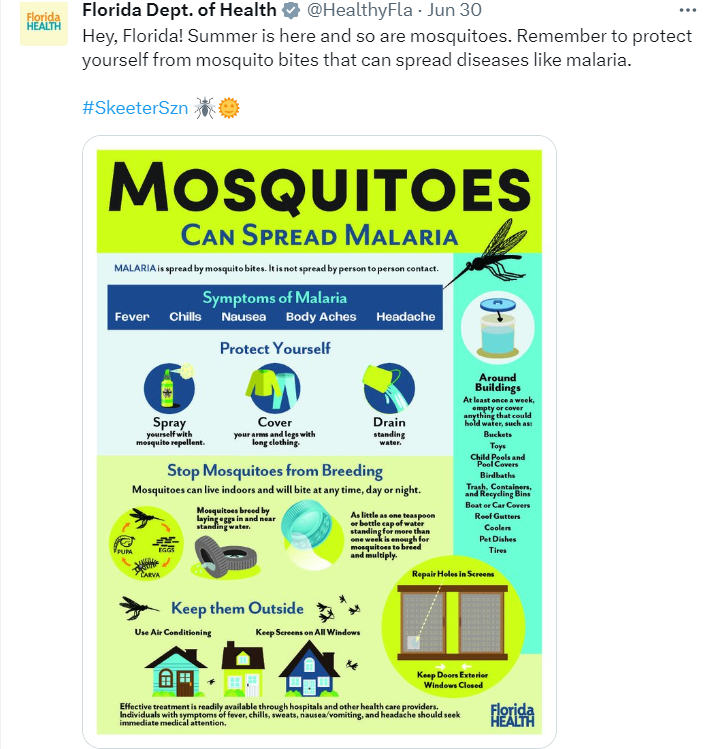NewsDesk @bactiman63
The Florida Department of Health reported two additional locally acquired malaria cases in the past week, bringing the state total to six.
All six cases were reported from Sarasota County and were identified as Plasmodium vivax.
On June 26, the Florida Department of Health issued a statewide mosquito-borne illness advisory due to the malaria cases.
 Malaria is a serious and potentially fatal disease caused by any of four species of protozoan parasites of the genus Plasmodium. Infection with Plasmodium vivax are generally less severe but may result in chronic infection due to parasites remaining dormant in the liver. Suspected or confirmed malaria should be evaluated and managed promptly.
Malaria is a serious and potentially fatal disease caused by any of four species of protozoan parasites of the genus Plasmodium. Infection with Plasmodium vivax are generally less severe but may result in chronic infection due to parasites remaining dormant in the liver. Suspected or confirmed malaria should be evaluated and managed promptly.
Transmission occurs through the bite of an infected Anopheles mosquito. Malaria may also rarely be transmitted from mother to fetus in utero or to neonate at parturition and contaminated blood, tissues, or needles. An infected person should take precautions to avoid mosquito bites while ill to prevent infection of local mosquitoes. Areas with endemic malaria transmission include Africa, South and Southeast Asia, the Middle East, Central America including Mexico, and South America.
Florida reports 6th Eastern equine encephalitis case in a horse
Incubation period varies by species, but in most cases is from 7 to 30 days.
Clinical presentation: Malaria is characterized by flu-like symptoms including fever which may be cyclical, nausea and vomiting, diarrhea, headache, and myalgia. Anemia, thrombocytopenia, elevation of bilirubin, and elevation of aminotransferases may also be seen. Symptoms of severe malaria include seizures, mental confusion, hemoglobinuria, kidney failure, acute respiratory distress syndrome, coma, and parasitemia >5%. Pregnant women and young children are at greater risk for severe malaria.
Subscribe to Outbreak News TV on YouTube
Treatment should be guided by the infecting malaria species, clinical status of the patient, drug susceptibility as determined by the geographic area where exposed, and previous use of antimalarials.
Malaria prevention consists of mosquito avoidance measures and chemoprophylaxis. An individual risk assessment should be conducted for each traveler to determine risk and appropriate prevention strategies.
- New Mexico: Health officials recommend clients of VIP Spa in Albuquerque get tested for blood-borne infections
- Michigan: Eastern Equine Encephalitis virus found in Bay County mosquitos
- Panama report 22 congenital syphilis cases in 1st half of 2023, Most in 24 de Diciembre
- Laos warns public of dengue as cases rise, more deaths reported
- Sri Lanka dengue cases top 50,000
- Crimean Congo hemorrhagic fever: 1st case reported in Gujarat, India this year
- Bangladesh dengue cases top 10,000 for 2023


